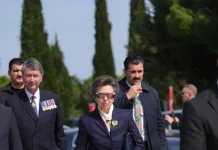On Sunday, April 13, Russian ballistic missiles struck the northeastern Ukrainian city of Sumy, resulting in at least 34 deaths and 117 injuries, making it the deadliest attack of the year.
The assault took place while residents attended Palm Sunday services, a significant church-going day in Ukraine.
Among those killed were two children. The missiles targeted densely populated areas, including residential buildings, cafes, shops, and a university. Ukrainian President Volodymyr Zelensky condemned the attacks as “deliberate acts of terror,” adding that “peace is impossible without pressure on the aggressor.”
Zelensky also confirmed that one missile hit a university building, while another exploded above a city street. Preliminary evidence suggests the use of cluster munitions, which disperse multiple explosives across a wide area, often leading to indiscriminate casualties.
The head of Sumy’s military administration reported that one missile detonated mid-air to maximize civilian harm.
International leaders quickly condemned the strike. Keith Kellogg, former U.S. special envoy to Ukraine and Russia, called it “a crossing of any line of decency.”
U.S. President Donald Trump, while aboard Air Force One, labeled the attack as “terrible” but claimed Russia had “made a mistake,” without further details. French President Emmanuel Macron called for “strong measures” to impose a ceasefire, and European Union foreign policy chief Kaja Kallas decried the strike as a “horrific example” of Russia escalating its attacks despite Ukraine’s acceptance of a ceasefire.
Zelensky, in an interview with 60 Minutes, criticized growing acceptance of Russian narratives in U.S. politics, asking, “How is it possible to witness our losses and suffering, to understand what the Russians are doing, and to still believe they are not the aggressors?”
Eyewitnesses shared harrowing accounts of the attack’s aftermath. Natalia Pihul, a Sumy resident, described how her mother was injured when a cupboard fell during the explosion. Glass, debris, and broken furniture filled the apartment. Footage from the scene showed burned vehicles, shattered windows, and emergency responders covering bodies. One video showed a trolleybus, struck by the missiles, with several dead passengers inside.
Among the victims were Olena Kohut, an artist with the Sumy National Theatre’s orchestra, and Liudmyla Hordiienko, a deputy head of the regional tax service. In total, 20 buildings were damaged in the strike. Of the injured, 68 were hospitalized, with eight in serious condition.
The United Nations’ humanitarian coordinator for Ukraine, Matthias Schmale, condemned the attack, emphasizing that international law prohibits attacks on civilians and civilian infrastructure.
Russia has intensified airstrikes in Sumy in recent weeks, pushing Ukrainian forces out of nearby areas and occupying settlements near the border. Further Russian attacks in Donetsk, Kharkiv, and Kherson in the past 24 hours killed eight people and wounded at least 18.
Zelensky urged the international community to act decisively to end the violence, saying, “Peace will not come through appeasement. It will only come through strength, unity, and justice.”












